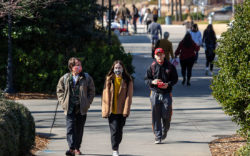Athens-Clarke County Commissioner Mariah Parker virtually attended a Phi Kappa Literary Society meeting on Nov. 17 to discuss anti-racism allyship with members of the University of Georgia community. But the tone of the conversation quickly changed when an anonymous user used racial and homophobic slurs, saying they believe Jewish, Black and LGBTQ people should “burn” during a Q-and-A portion of the meeting.
A second voice started repeatedly yelling a racial slur, prompting the meeting’s host to scramble to kick out the user as others attempted to join the call in a “coordinated attack,” Parker said. The host finally decided to end the call and discretely shared a new link with the audience. The university is still investigating the incident, said James Hataway, media relations manager for UGA’s Marketing and Communication office.
“We never saw the faces of the people that did it,” Parker said. “They can jump on, ruin your day and leave without any consequences, as opposed to the bravery it actually takes just to speak what you think is truth to power in a physical space. This is a new way of low-stakes terrorism.”
Emboldened Online
The world embraced the “new normal” by shifting from in-person meetings to online video calls as the COVID-19 pandemic forced people to socially distance from one another, but these virtual meetings give bad actors a new way to infiltrate conversations and spread hurtful words and threats. This was but one of several “Zoombombings” experienced by members of the UGA and Athens communities this year.
In response to the incidents, UGA’s Enterprise Information Technology Services now requires the use of waiting rooms on all UGA-affiliated Zoom meetings since Nov. 30. The host of each meeting must now manually admit any user who attempts to join a Zoom call without an official UGA email address.
During its virtual informational meeting held for UGA’s Involvement Fair on Sept. 3, the Hispanic Student Association experienced one of the first recorded Zoombombings that specifically targeted individuals over their racial or ethnic identity. A user joined the call with the name “Jose Cuervo,” speaking and screaming over one of the organization’s executive members, said Emelynn Arroyave, the HSA’s political action chair.
After the host kicked out the user, another user joined with a profile picture of a naked man wearing a sombrero. This user started screaming obscenities and Spanish curse words before being kicked out. When the user rejoined, he accidentally turned on his camera, which revealed the culprits as two white men, Arroyave said.
The HSA went through the “chain of command” to UGA’s Office of Student Affairs and Equal Opportunity Office, Arroyave said. The organization felt dissatisfied with the university’s response to the Zoombombing, alleging in a statement that UGA tried to place the blame on the HSA for sharing its Zoom link on social media. The statement called for the university to develop protocols to better protect its students from harassment.
“The people in the involvement fair were mostly all first-years, and this was their introduction to UGA and HSA specifically,” Arroyave said. “For Hispanic people coming to UGA, HSA is a safe space on campus that will always be there for you. They’re not going to want to attend this university if they see that this is how students of color are being treated on this campus.”
The EOO determined the culprits joined the meeting from Massachusetts, said Greg Trevor, interim senior executive director of UGA’s Marketing and Communications office. Arroyave said she learned the Zoombombers attended a boarding school in Massachusetts before facing expulsion, and she suspects they learned about the meeting through a connection at UGA.
In the last few weeks, UGA Vice President Victor Wilson reached out to the HSA to address its concerns and hear its proposed reforms, Arroyave said. He promised the group he’ll see what the university can accomplish to uplift students of color on campus, she said.
“The university condemns these outrageous acts in the strongest terms,” Trevor said. “While we have been relieved that, to date, none of the responsible parties has been linked to UGA, no one in our community—whether student, faculty or staff—should have to deal with offensive and hateful comments directed at them.”
The HSA now requires registration for all meetings and sends its Zoom link out only 10 minutes before they start, in addition to using the waiting-room function. It stopped publicizing its Zoom link on social media, but that’s not a foolproof method for curbing virtual harassment.
In a guest lecture about violence against women of color, Harvard University professor Lorgia García Peña and three UGA professors experienced a Zoombombing on Oct. 28. The professors had advertised the lecture only through listservs for UGA’s Department of Romance Languages and women’s studies classes, and the host used a waiting room to admit attendees.
During a Zoombombing that lasted about five minutes, the perpetrators announced UGA professor Sharina Maillo Pozo’s home address, called the guests racial slurs and threatened their families with meat cleavers, gave ransom threats, shouted they were members of the Ku Klux Klan and showed a video of a dismembered body, according to The Red & Black. García Peña and Maillo Pozo declined to provide further comment to Flagpole.
Upon investigation, the IP addresses of the perpetrators appeared to come from locations across the U.S. and the world, according to an email sent by EOO Interim Director Elizabeth Bailey to UGA President Jere Morehead and Franklin College of Arts and Sciences Dean Alan Dorsey on Nov. 16. EOO Assistant Director Kris Bolden and UGA Police Capt. Jeff Hammock suspect the users are not affiliated with the university and that the meeting ID was obtained and shared via an online forum, according to the email.
UGA’s Next Act, a student organization in the Department of Theatre and Film Studies, experienced a targeted Zoombombing in late September. A group yelled racist, homophobic and transphobic language after Next Act’s cabaret show, according to Grady Newsource. Next Act did not respond to Flagpole’s requests for comment.
Mokah Jasmine Johnson, an Athens activist and former candidate for District 117 in the Georgia House of Representatives, also encountered a Zoombombing during her campaign, albeit unaffiliated with the university. Three users hurled racial insults and slurs at Johnson, with one user telling her to shut up and calling her the N-word in less than three minutes of an October political forum hosted by the Oconee Enterprise. In response, she hosted a “Stand Up to Racism” rally on Oct. 23.
“Racism and hate are part of politics. I know some people will not accept me or vote for me, just because I am Black,” Johnson said in a statement. “Some of my future constituents may think of me as a nigger. But I am not afraid of this. I will not allow hate to stop me from standing up, from speaking out on issues that shape this community, such as protecting public education and demanding justice for Black lives.”
Parker thinks the racist, homophobic and xenophobic remarks stem from a place of fear and hatred amid the reawakening of Black Lives Matter and other social movements in the public’s eye. “I try to feel a sense of empathy when I think about why this happens and think about the emotions behind people’s motivations,” Parker said. “I think there must be a lot of anger out there from folks that see the world changing to no longer center them and who feel intimidated by that, who then lash out to reassert their dominance and control.”
With everything occurring online nowadays, it is easier to spread hateful language and threats, as “people are bolder behind the screen,” Arroyave said. With the pointed attacks against people of color, it could discourage social justice activists from continuing their fight, Parker said.
Finding a support group and sharing the experience with others helped the HSA with its recovery process, Arroyave said. After encountering a Zoombombing, Parker recommends taking time to heal and reflect on what happened. After her experience, Parker, a PhD student in linguistics, canceled the following day of class for one of the courses she teaches, which was met with support and understanding from her students, she said.
“It’s my hope that we have those tools in our toolkits to really quickly process and heal from incidents like this and keep moving,” Parker said. “I have found a lot of energy in these moments to keep pushing. Channel that rage into something productive.”
Protecting Your Calls
Here are a few tips from EITS to consider implementing on your Zoom calls to prevent unwanted guests:
• Don’t use your personal Zoom ID to create meetings. Instead, use a random meeting ID generated by Zoom for each meeting you create.
• Avoid sharing your Zoom meeting link on a public platform like social media. If you do, require authentication for your guests with a custom meeting password, the guest’s own email or two-factor authentication.
• Allow only signed-in users to join the meeting. Zoom gives you the ability to allow only participants signed into Zoom with the email address used for their meeting invite.
• Make sure that only the host of the meeting can share their screen, which could prevent someone from sharing unwanted content.
• Turn off in-meeting file sharing, which could prevent an interloper from potentially sharing malicious files with your guests on the call.
• Disable in-meeting chat, which will prevent a potential Zoombomber from harassing other participants.
• Use Zoom’s virtual waiting room feature, which will allow the host to vet a guest before they are permitted to enter the actual meeting.
• After all participants join and the call starts, lock the meeting.
If you suspect a Zoombomber in your meeting, EITS recommends putting them on hold, disabling their audio, video and chat permissions or kicking them out from the meeting. If malicious users continue to join the meeting, you should end the meeting and create a new meeting with a different Zoom ID. All members of the UGA community should report Zoombombings to the EOO, Trevor said.
Like what you just read? Support Flagpole by making a donation today. Every dollar you give helps fund our ongoing mission to provide Athens with quality, independent journalism.










